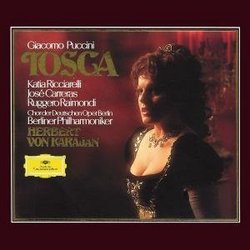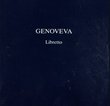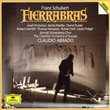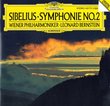| All Artists: Gottfried Hornik, Giacomo Puccini, Herbert von Karajan, Berlin Philharmonic Orchestra, Berlin State Opera Chorus, Schöneberger Sängerknaben, Katia Ricciarelli, Heinz Zednik, José Carreras, Wolfgang Bunten, Fernando Corena, Ruggero Raimondi, Victor von Halem Title: Giacomo Puccini: Tosca Members Wishing: 0 Total Copies: 0 Label: Decca Import Release Date: 11/22/1984 Album Type: Import Genre: Classical Styles: Opera & Classical Vocal, Historical Periods, Modern, 20th, & 21st Century Number of Discs: 2 SwapaCD Credits: 2 UPC: 028941381521 |
Search - Gottfried Hornik, Giacomo Puccini, Herbert von Karajan :: Giacomo Puccini: Tosca
 | Gottfried Hornik, Giacomo Puccini, Herbert von Karajan Giacomo Puccini: Tosca Genre: Classical
|
Larger Image |
CD DetailsSimilar CDs |
CD ReviewsAn exceptional recording of Tosca. Deserves more than 5 star PhantomOfTheOpera | Norway | 08/31/2005 (5 out of 5 stars) "In my humble opinion this is the best "Tosca" ever recorded. I bought it a few months ago and I have played it over and over again. Recently I also bought the edition with Caballé and Carreras from 1976 because I've heard the aria "e lucevan le stelle" from that one and it makes my hair stand on end. But even though Carreras' singing is wonderful in the -76 recording, the opera on the whole doesn't even come close to this one. The reason for that is the collaboration between Carreras/Ricciarelli and Raimondi and also Von Karajans conducting in this -79 recording. The first time I listened to this opera I immediately picked up the extraordinary chemistry between Carreras and Ricciarelli. Whether it's the love between Carreras/Ricciarelli or Cavaradossi/Tosca that leaps at you from the speakers I don't know, but the result is spectacular. Ricciarelli's Tosca is absolutely beautiful and she's my favourite Tosca. You can immediately hear that she loves her Cavaradossi to pieces which makes her jealousy more understandable and you share her pain in the scene where Cavaradossi is tortured just as you share her madness when she kills Scarpia. Carreras's Cavaradossi is equally wonderful and passionate.This is really singing from the soul. He is also madly in love with Tosca which makes him bear with her jealousy. Just listen to him gently reproving her in "qual occhio al mondo". His rendition of "e lucevan le stelle" is out of this world. His recollection of their romance is at first sensual and at the end of the aria you can feel his despair when he realizes that he will never experience it again. He is also outstanding in the torture-scenes. His loud cries (Ahime!!) pierces my heart every time. (And who said that Carreras didn't have a strong or powerful voice???) It's no wonder Tosca caved in an revealed Angelotti's hiding place after Cavaradossis' last agonizing scream. I have no suitable words to describe how it sounds, but I'm amazed that it's possible for a man of Carreras' stature, to actually produce such a sound. It's "powerful and roaring agony". You just have to listen for yourself. Here's none of that "schoolboy-whimpering" that's heard in other recordings of Tosca. In my opinion no-one can beat Raimondi's Scarpia. Raimondi has a rich, dark, velvet voice. He's a rather nasty Scarpia, but still strangely attractive. His voice can be incredibly strong and make you tremble with fear. I'm scared stiff when he's roaring "Tosca, finalmente MIIIIIIAAAAA....." And he's priceless when Tosca begs him to save Cavaradossi. He just says "I...???? You..!!!!!" in the most arrogant voice ever. He sounds like he's enjoying himself immensely because he knows that he holds the power over Tosca at that moment. The supporting cast in this opera is also excellent, especially Fernando Corena as the sacristan and Gottfried Hornik as Angelotti. Von Karajan's conducting is wonderful. The music is bombastic when needed or -like in the scenes with Scarpia - really frightening. And the really loud cannon-shot makes me jump every time, even though I know it's coming. But in the scenes between the two lovers the music is unbelievably soft and the tempo is slower than in the rest of the opera and you can "indulge" yourself in the sweet love between the two protagonists. This opera is really passionate drama from beginning to end. There's not one dull moment that I can think of. Tosca is one of my favourite operas and I could go on forever raving about this recording, but my best advice is to buy this opera and listen and judge for yourself." One Of The Many Supreme Tosca Recordings Rudy Avila | Lennox, Ca United States | 07/30/2005 (5 out of 5 stars) "The reviews for this album have been rather good, and the critic before me seems to be infatuated with the opera Tosca itself and the many fine sopranos who have performed the role in their career- Maria Callas, Renata Tebaldi, Leontyne Price, Birgit Nilsson, Mirella Freni, Carol Vaness and Angela Gheorghiu. He also left out Hildegard Behrens and Eva Marton. All of these ladies have sung knock-out Toscas. But Katia Ricciarelli holds her own in this well-executed recording with a cast that interprets the opera with dynamic musicianship and beautiful voice, especially in the dream-team that was Katia Ricciarelli and Jose Carrerras. Luckily, these two were not just about producing beautiful tones, they truly immersed themselves into their characters with dramatic conviction. This duo is further quite noteworthy as opera's great lovers because during their careers, Jose Carrerras and Katia Ricciarelli were lovers, despite the fact Carrerras was married. Their affair was highly publicized. But even this "scandal" didn't stop fans from attending their incredible performances, the likes of which had not been seen since the old days of the great tenor/soprano dynamics in the singers like Di Stefano and Callas, Tebaldi and Corelli and Nilsson and Vickers. Carrerras and Ricciarelli joined the ranks of these great partners in the 80's, when they were singing all over the world and their career was in full bloom. On recordings, they are also powerfully dramatic and gorgeous to hear from a vocal point. Other fine studio recordings of theirs include an exceptional La Boheme and Il Trovatore. Carrerras went through much in his personal life, even a bout with cancer. Despite his inner demons, he successfuly survived everything and came out on top. It was his idea to get together with Luciano Pavoratti and Placido Domingo (who were actually rivals) and form the 90's hit -The Three Tenors!! Carrerras is a humble, unassuming man, who made up for his stature by singing all the great Italian tenor roles, and as Cavaradossi he is brilliant, absolutely brilliant. He intones the character with passion, with intelligence, and with a kind of despair that he is himself familiar with. This is why his Cavaradossi is perhaps the most truthful. I have not heard Cavaradossi sung as great, except for the interpretations of Franco Corelli and Giuseppe Di Stefano and later on Domingo. "Ricondita Armonia" is sung with flair and with dreamy lyricism, a love song to his beloved Tosca (or Ricciarelli ?) which is a great example of how to sing the aria. Even better is his "E lucevan la stelle" which is a tenor signature if sung well. In Carrerras, we have the true Cavaradossi that I have searched for in many recordings. Katia Ricciarelli is a grand Tosca. I had no idea she had sung the role. Her voice is dramatic, but purely lyric, and she managed to do justice to the role that is most associated with the heavier voices (remember, Callas, Tebaldi, Nilsson and Price sang Tosca) Ricciarelli, in singing the heavy role joined the ranks of the likes of Mirella Freni and Kiri Te Kenawa, whose voices are way lighter than even Ricciarelli but who sang Tosca nonetheless. From the start, when she spews her jealou rant about seeing a woman in the Chapel and that Cavaradossi is hiding a lover, she doesn't break character to simply sound gorgeous like Montserrat Caballe would do. She does sound beautiful, but she is Tosca all the way through. Her scenes with the magnificent baritone Ruggero Raimondi (Scarpia) are electrifying. Her voice is shattering in its intense despair and horror upon discovery that the loathsome and lustful Scarpia is torturing Cavaradossi and plans to seduce her. She sings all the high notes with flair. Yes, with flair, with pithc-perfect clarion strength, even if other critics think otherwise. When she stabs Scarpia in the famous scene, she is so believable that it came as no surprise for she had already flashed hints of murder for Scarpia. Raimondi is brilliant, and is in better voice in this 80's recording than his later Scarpia with Angela Gheorghiu which was made in 2001. Raimondi is now an older man, but his voice is still there, just not as fresh as it is here or when he was singing Don Giovanni back in the late 70's and early 80's. There is a terrific Joseph Losey film with Raimondi as Don Giovanni. Raimondi is nasty but subtle, with a hard shell as Scarpia, cold, clinical and brutal. He is more like Dietrich Fischer Dieskau than Tito Gobbi, Sherill Milnes or Cornell McNeil who have sung traditionally melodramatic Scarpias. So there you have it. I hope this is enough to make you interested in this recording and to add it to your collection if you already own a dozen other Toscas." Splendour and intensity Armindo | Greece | 11/05/2005 (5 out of 5 stars) "Both Ricciarelli and Carreras show their first signs of wear on this recording but they are still hard to resist. Their passionate and gorgeous voices blend in magnificently and with the probably most elegant Scarpia of Raimondi, the trio brings life to this usually abused opera.
Ricciarelli's instrument is undeniably weak and unfocused for Tosca and singing the role certainly didn't prolong her career but the voice is so sexy you forget the problems. All the nuances are there too. Carreras was in better voice for his Davis' Tosca with Caballe but still delivers the goods. His wonderful phrasing make him one of my favourite Marios. Raimondi is one of the intelligent Scarpias we expect to charm Tosca and with such legato, it is no wonder she is tempted. and Corena started singing Sagrestano almost 30 years before this recording and still has the character in '79. Karajan deserves special praise for his contribution must have been significant to achieve such intensity. His orchestra is as always grand but for once it is embracing the singers rather than strangling them. The crisp sound also helps. There are better individual performances (Tebaldi, Bastianini, the younger Carreras, Del Monaco come to mind) but the overall effect is that of a very successful Tosca recording! " |

 Track Listings (15) - Disc #1
Track Listings (15) - Disc #1

